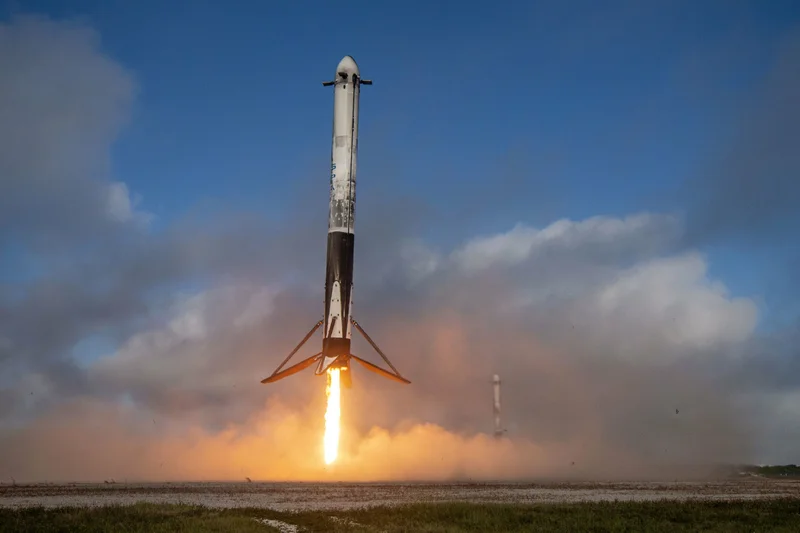XLM Insight | Stellar Lumens News, Price Trends & Guides
XLM Insight | Stellar Lumens News, Price Trends & Guides
So, another rocket went up last night.
Actually, scratch that. Two of them went up. One took off from California while most of America was settling in for the night, and another blasted off from Florida while the rest of us were asleep. If you happened to be outside at the right moment, you might have seen a "bright light in the sky," as one local news outlet so poetically put it. A bright light. That’s what we call a multi-billion-dollar private space program now—a passing flicker, a celestial curiosity you might mention to your spouse before forgetting about it completely.
Let’s be real. This isn’t about exploration anymore, is it? We’re not collectively holding our breath, gathered around grainy TV sets, watching heroes strap themselves to a pillar of fire. We’re watching a shipping company make its deliveries. And last night’s launch, the Starlink 11-17 mission, was just another Tuesday night run.
The star of the West Coast show was a Falcon 9 booster with the tail number B1071. This wasn't some shiny, new machine fresh off the factory floor. This was its 29th flight. Think about that for a second. Twenty-nine times, this metal tube has been shot into the heavens, deployed its payload, and then plummeted back to Earth to land itself upright on a floating barge named ‘Of Course I Still Love You.’
This rocket has done more work than most people I know. It's hauled satellites for NASA, five different secret payloads for the National Reconnaissance Office (don't ask), and a bunch of rideshare missions. It’s the space-faring equivalent of a beat-up Ford F-150 with 400,000 miles on the odometer. It’s dented, it’s scorched, but it starts up every time.
And that’s the part that bothers me. This incredible feat of engineering, this reusable rocket, has become so routine that it’s lost all its magic. It’s a city bus on the Low Earth Orbit Express. The doors hiss open, the satellites get on, and it rumbles off to its destination on a south-easterly trajectory. The whole thing is autonomous, a cold, calculated ballet of physics and code. The booster lands itself, the confirmation comes in, and the cycle repeats. Offcourse, it's an incredible achievement, but it feels less like a triumph and more like the perfection of a cosmic assembly line.

What's the breaking point here? Is there a 30-flight inspection? A 50-flight retirement party? Or do they just keep flying B1071 until it scatters itself across the Pacific? We celebrate the reusability, but we never talk about the risk that grows with every single launch. At what point does a marvel of engineering just become a ticking clock?
The real story isn't what went up; it's how little anyone cared. The Florida launch was just after 2 a.m. The California one was at 9 p.m. local time. Both were just blips on the news feed, sandwiched between political outrage and celebrity gossip. I saw the notification on my phone and just swiped it away. It's a bad sign. No, "bad" doesn't cover it—it's a symptom of our collective exhaustion.
We’ve successfully industrialized space. Congratulations. We've turned the final frontier into another logistics chain. SpaceX isn't launching rockets; it's deploying infrastructure. These 28 Starlink satellites aren't about expanding human knowledge; they're about ensuring you can get a decent Wi-Fi signal at your remote cabin so you can stream the latest brain-numbing reality show. We've traded cosmic awe for better download speeds.
It reminds me of living in a city with a train line running through it. The first few times the train thunders past, you stop and stare at the sheer power of it. After a week, you don't even hear it anymore. It's just background noise. That’s what these launches have become: background noise. A "bright light." A minor atmospheric event. We’ve managed to make blasting a 23-story building into orbit feel mundane. That ain't progress, that's a failure of the imagination.
And for what? A "megaconstellation" of satellites that are already making it harder for astronomers to see the actual universe. We're filling the sky with our own junk, creating a digital ceiling over our heads, and we're so busy looking down at our phones that we don't even notice. We’ve traded the stars for a grid of flying routers, and honestly...
Maybe I’m the crazy one. Maybe this is exactly what progress is supposed to feel like—the spectacular becoming ordinary. But it feels like we’ve lost something vital in the process. The sense of wonder, the shared moment of looking up and feeling small but part of something immense, has been replaced by the quiet hum of relentless, efficient, and soul-crushingly boring competence.
So they did it. SpaceX, Musk, the whole enterprise. They won. They made spaceflight so reliable and frequent that it’s no longer an event. It's a utility, like water or electricity. The final frontier has been paved, zoned for commercial use, and turned into the world's most impressive fulfillment center. The magic is officially gone, and all we have left to show for it are a couple of fleeting bright lights in the night sky. And I can't help but feel that's a hell of a bad trade.